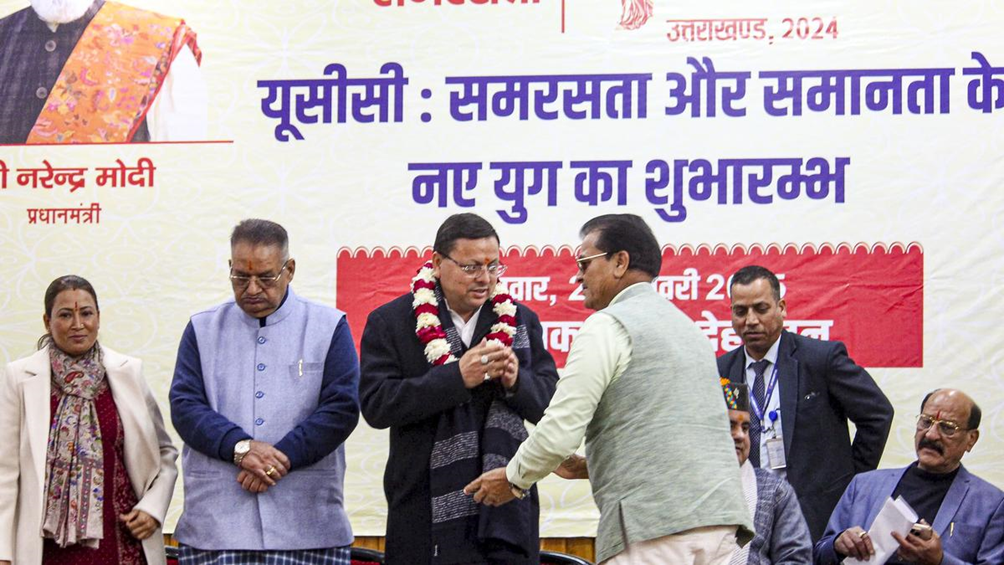- Courses
- GS Full Course 1 Year
- GS Full Course 2 Year
- GS Full Course 3 Year
- GS Full Course Till Selection
- Answer Alpha: Mains 2025 Mentorship
- MEP (Mains Enrichment Programme) Data, Facts
- Essay Target – 150+ Marks
- Online Program
- GS Recorded Course
- NCERT- First Ladder
- Polity
- Geography
- Economy
- Ancient, Medieval and Art & Culture AMAC
- Modern India, Post Independence & World History
- Environment
- Governance
- Science & Technology
- International Relations and Internal Security
- Disaster Management
- Ethics
- Current Affairs
- Indian Society and Social Issue
- CSAT
- 5 LAYERED ARJUNA Mentorship
- Public Administration Optional
- ABOUT US
- OUR TOPPERS
- TEST SERIES
- FREE STUDY MATERIAL
- VIDEOS
- CONTACT US
All About UCC Rules for Live-in Relationships in Uttarakhand
All About UCC Rules for Live-in Relationships in Uttarakhand

Context:
Live-in relationships, once considered taboo, have gained acceptance due to urbanization, economic independence, and changing social norms. In India, courts have recognized these relationships as legal, balancing personal autonomy with societal concerns. The Uttarakhand Uniform Civil Code (UCC), effective January 2025, mandates registration of live-in relationships, triggering debates on privacy (Article 21 of the Constitution), legal recognition, and state intervention.
Recently, the Uttarakhand government registered the first live-in relationship among the six applications received, which are currently being examined .
What Are Live-in Relationships?
- A live-in relationship refers to cohabitation between two consenting adults without entering into a legally recognized marriage.
- While historically stigmatized, such arrangements are increasingly seen as a way to test compatibility before marriage or to maintain personal independence.
- Factors like financial stability, social mobility, and evolving values contribute to their rising prevalence in India.
Legal Provisions and Judicial Precedents on Live-in Relationships
Indian courts have shaped the legal framework for live-in relationships through various judgments and constitutional provisions:
- Legal Recognition:
- S. Khushboo v. Kanniammal (2010): The Supreme Court held that live-in relationships are not illegal and fall within the right to life under Article 21 of the Constitution.
- Justice K.S. Puttaswamy v. Union of India (2017): Established the right to privacy (Article 21), which encompasses both informational privacy and decisional autonomy. There can be no disproportionate intrusion by the state into the private realm of an individual.
- Lata Singh v. State of U.P. (2006): The Supreme Court affirmed that a major woman is free to marry or live with anyone of her choice, emphasizing individual autonomy.
- Protection Under Laws:
- Indra Sarma v. V.K.V. Sarma (2013): Identified conditions that classify a live-in relationship as a relationship in the nature of marriage, extending protection under the Domestic Violence Act, 2005.
- Bharata Matha v. R. Vijaya Renganathan (2010): Ruled that children born from live-in relationships are legitimate and have inheritance rights over the parents property under Section 16 of the Hindu Marriage Act, 1955
Provisions of the Law in Uttarakhand:
One of the most debated facets of this UCC has been the mandatory registration of live-in relationships.
- Mandatory Registration: Couples must register their live-in relationship within one month of commencement.
- Eligibility
- Only unmarried, heterosexual couples are recognized under this provision.
- Both partners must not be within a subsisting marriage and must be adults (i.e., at least 18 years old for women and 21 years old for men).
- Documentation Process:
- Registration requires a 16-page form backed by detailed supporting documents: photographs, Income Tax PAN, Aadhaar (linked to phone number), and proof of residence in Uttarakhand.
- Couples already living together must provide proof of shared residence (electricity/water bill or a rent agreement).
- Landlord Verification:
- Landlords are required to verify the status of the relationship by asking for the registration certificate (provisional or final) to be included in the rent agreement.
- Notification to Parents/Guardians:
- If one or both partners are between 18 and 21 years of age, the registrar must notify parents or legal guardians of the registration.
- The same procedure applies if the couple decides to terminate the live-in relationship at a later point.
- Verification Process/Privacy:
- The law allows registrars to ensure that relationships are not established through coercion, fraud, or undue influence.
- Couples must disclose any previous live-in relationships or marital status.
- Only registrars will be able to view the details of the applications.
- Officials can only view the number of applications as details would be encrypted.
- Restrictions on Certain Relationships:
- Borrowing from the Hindu Marriage Act, 1955, the UCC disallows registration of relationships falling under prohibited degrees of kinship, unless justified by local customs.
- Penal Provisions
- Failure to register: Imprisonment up to three months or fine up to ₹10,000.
- False information: Fine up to ₹25,000 or three months’ imprisonment.
- Landlord violations: Fines for non-compliance with verification rules.
What Are the Benefits of Such a Law?
- Protection for Women
- Ensures women in live-in relationships can access rights under the Domestic Violence Act, 2005, safeguarding them from domestic abuse, abandonment, and financial distress.
- Legal Recognition
- Provides official status, simplifying legal matters like inheritance, property rights, and custody, making it easier for individuals in live-in relationships to access legal protections available to married couples.
- Fraud Prevention
- Protects individuals from deception regarding marital status, aligning with Section 494 of the IPC (Bigamy Laws).
- Registration reduces instances of one partner concealing their previous marital status.
- Social Acceptance
- Encourages gradual normalization of live-in relationships by providing them with a legal framework, potentially reducing societal stigma over time.
- Data and Policy Formulation:
- Helps in policy formulation for family structures, social security, and welfare schemes by providing an official database of live-in relationships
- For instance, policy interventions for women’s welfare, property disputes, inheritance claims, and child welfare issues can become more effective if authorities have concrete records.
Criticisms and Concerns
Despite the purported benefits, several concerns have been raised regarding the new provisions:
- Privacy Violations:
- Mandatory registration infringes upon the right to privacy (Article 21 of the Constitution) by compelling individuals to disclose personal information to the state. The Supreme Court in Justice K.S. Puttaswamy v. Union of India has explicitly upheld that privacy includes the freedom to make intimate personal choices without undue State surveillance.
- Lack of information about measures to secure and encrypt data raises question about system integrity.(For e.g. recent claim by a certain group of obtaining data)
- Potential for Harassment:
- Public disclosure requirements may expose couples, particularly interfaith and inter-caste partners, to social backlash and family pressure, leading to increased vulnerability.
- Risk of Social Stigma and Vigilantism:
- The law may increase the likelihood of “social surveillance” as personal information about unmarried couples could fall into the hands of local community members or vigilante groups.
- With no clear data-protection safeguards, the exposure of personal details may lead to targeted harassment or violence, particularly in conservative communities.
- Legal and Constitutional Issues:
- Critics argue that the law violates Article 14 (Equality before Law) and Article 19 (Freedom of Choice) by imposing excessive restrictions on live-in relationships, which are otherwise legally recognized by courts.
- Opponents also argue that singling out live-in couples for mandatory registration while ignoring other adult consensual relationships is arbitrary.
- Administrative Burden:
- The registration process, verification, and enforcement create a bureaucratic load that could lead to delays, inefficiencies, and potential corruption
- Risk of Misuse: The law could be misused by disapproving family members to interfere in personal relationships, creating legal hurdles for consenting adults.
Way Forward
- Strengthen Privacy Safeguards:
- Ensure that the registration process maintains confidentiality to prevent social backlash or harassment.
- Public Awareness and Sensitization:
- Government and civil society should educate individuals about their rights and remove stigma around live-in relationships.
- Simplified Registration Process:
- The government should introduce streamlined, non-intrusive registration mechanisms that do not disproportionately burden couples and grievance redressal mechanisms.
- Protection Against Misuse:
- Legal provisions should be put in place to prevent registration laws from being misused by family members or external parties to harass individuals in live-in relationships.
Incorporating Gender-Neutral Provisions:- The law should consider expanding eligibility criteria to recognize same-sex and other non-heteronormative partnerships for equitable legal protections.
- Legal provisions should be put in place to prevent registration laws from being misused by family members or external parties to harass individuals in live-in relationships.
- Judicial Oversight:
- Given the possible conflict with constitutional freedoms, courts may need to provide final clarity. For Example regarding constitutionality of mandatory registration under Articles 14, 19, and 21
- Judicial scrutiny can help refine provisions that are found overly intrusive or discriminatory.
Global Practices
- France: The PACS grants legal status to unmarried couples, offering financial, inheritance, and tax benefits similar to marriage while allowing flexibility in separation.
- Canada & U.S.: Common-law partnerships are recognized after a specific period of cohabitation, granting partners legal rights related to property, inheritance, and spousal support without requiring formal registration.
- Australia & New Zealand: De facto relationships provide marriage-like legal protections, ensuring rights in areas such as financial settlements, child custody, and inheritance upon separation or death of a partner.
- United Kingdom: Civil partnerships allow unmarried couples, including same-sex couples, to have the same legal and financial rights as married partners, including inheritance, tax benefits, and parental rights.
- Sweden & Netherlands: These countries offer cohabitation agreements, which allow couples to define legal rights related to property, financial support, and childcare, offering flexibility and security without mandatory marriage.
Conclusion
The Uttarakhand UCC’s registration mandate represents a significant policy shift, aiming to provide legal clarity while raising concerns about privacy and autonomy. A balanced approach, incorporating judicial oversight, policy refinements, and public awareness, is crucial to ensuring that personal freedoms remain intact while addressing legal and social challenges of live-in relationships in India.
|
Also Read |
|
UPSC Foundation Course |
|
| CSAT Foundation Course | |





